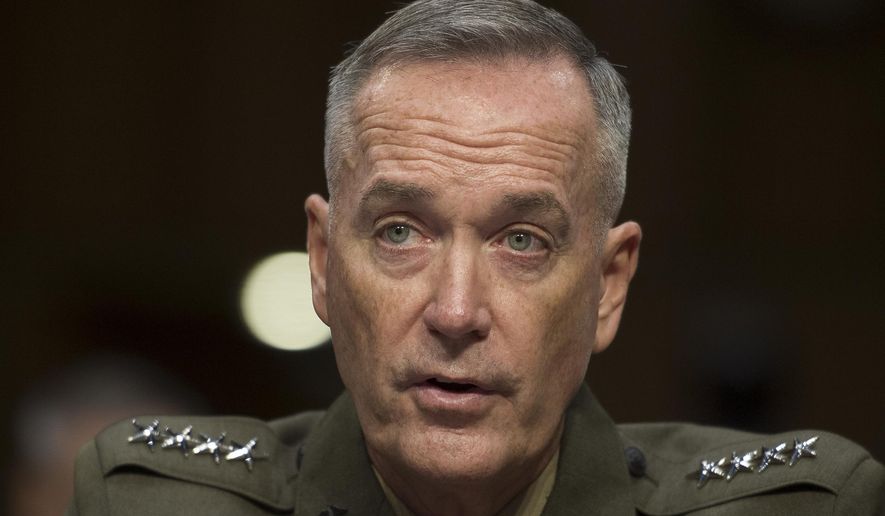Gen. Joseph Dunford said Thursday that despite conflicts in the Middle East with terrorist groups, Russia poses the greatest threat to the United States today.
“My assessment today is that Russia poses the greatest threat to our national security,” Gen. Dunford told members of the Senate Armed Services Committee in a hearing to consider his nomination to be the next chairman of the joint chiefs. “if you look at their behavior, it’s nothing short of alarming.”
Gen. Dunford said Russia’s nuclear capability, as well as the country’s threat to the sovereignty of American allies, makes the country a larger threat than the Islamic State.
Members of the Senate Armed Services Committee largely praised Gen. Dunford, who currently serves as the commandant of the Marine Corps, for his 38 years of service that include time leading troops in Afghanistan, but used the hearing on his nomination to lead the joint chiefs speak out against other problems facing the department like the Islamic State, what the U.S. footprint in Afghanistan will look like in the future and across-the-board budget cuts known as sequestration.
Asked if he would advise the president to remove all U.S. troops from Afghanistan as planned by the end of 2016, Gen. Dunford said his experience there has taught him that assumptions often don’t come true, especially when they’re time-related.
“I can assure you if I’m confirmed I’ll provide advice to the president that will allow us to meet our current end state goal and that’ll be based on conditions on the ground,” he said.
“I’ll certainly go over there and check those if confirmed,” Gen. Dunford later added.
Sen. Jack Reed, Rhode Island Democrat and ranking member of the Senate Armed Services Committee, questioned Gen. Dunford on how critical federal agencies other than the Defense Department were to success in Afghanistan.
“In particular, our relationship with State Department in Afghanistan was absolutely critical to our success,” Gen. Dunford said.
In the fiscal 2016 defense policy bill currently in conference, Republicans fully funded the Defense Department at the administration’s requested level, but did so by adding extra money to the overseas contingency operations fund, not the base budget. By doing so, lawmakers were able to give the military more money in the war fund, while not providing any sequester relief for other agencies.
Sen. Claire McCaskill, Missouri Democrat, also criticized using the war fund for a portion of the department’s budget, asking Gen. Dunford about the need for other agencies such as the FBI and Federal Aviation Administration.
“All those organizations plan an inextricable role in keeping us safe,” he said.
Gen. Dunford said allowing sequestration cuts to go into effect later this year would have “catastrophic consequences” for the military’s readiness and ability to keep the nation safe.
“I believe we’re at the razor’s edge,” he said. “Out readiness level is at the point right now where if we were to go below this level, we would have to adjust the ends of our strategy.”
Despite lawmakers criticizing the administration’s strategy against the Islamic State and the current budget crisis facing the department under sequestration caps, most praised Gen. Dunford and said they felt confident he would sail through a confirmation vote in the full Senate to take over when current Chairman of the Joint Chiefs Gen. Martin Dempsey retires later this year.
“It’s comforting knowing you’re going to be there giving your wise counsel,” Sen. Bill Nelson, Florida Democrat, said.
• Jacqueline Klimas can be reached at jklimas@washingtontimes.com.




Please read our comment policy before commenting.